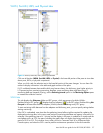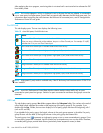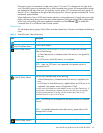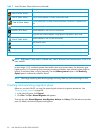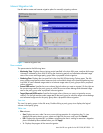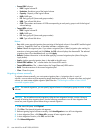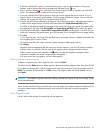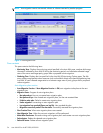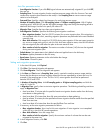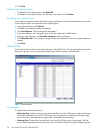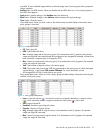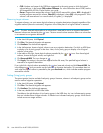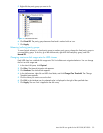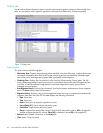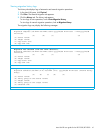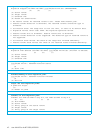Auto LUN XP user guide for the XP12000/XP10000 35
Auto Plan parameter section
• Auto Migration Function: If you click ON, logical volumes are automatically migrated. If you click OFF,
they are not.
• Sampling Term: The auto migration function analyzes resource usage within the S
AMPLING TERM and
creates auto migration plans based on that analysis. Use Sampling Term to narrow resource usage
statistics to be analyzed.
• Date and Time: Specifies a date/time frequency for analyzing resource usage.
• Number of Sampling Points: Click All sampling points or X highest sampling points. With X highest
sampling points, Auto LUN XP uses the Xth highest average usage rate during the sampling period to
determine disk usage. Use the list to specify the value of X.
• Migration Time: Specifies the time when auto migration starts
• Auto Migration Condition: Specifies the following auto migration conditions:
• Max. migration duration: Time limit (10-120 minutes) for an auto migration plan. If the migration is
not completed within this limit, remaining migration operations are performed at the next scheduled
execution time.
• Max. disk utilization: Disk usage limit (10-100%) during auto migration. If the most recent usage for
any source or target parity group is over this limit when auto migration starts, Auto LUN XP cancels
the auto migration plan and retries the plan at the next execution time.
• Max. number of vols for migration: The maximum number of volumes (1-40) that can be migrated
during one auto migration plan.
• Default button: Sets parameters to their default values and applies them to the disk array.
• Set button: Applies parameters to the disk array.
• Reset button: Restores parameters to the value before the change.
• Close button: Closes this pane.
Setting auto migration parameters
1. In the Auto LUN pane, click Physical.
2. Click Plan. The Manual Migration tab appears.
3. Click Auto Migration. The Auto Migration tab appears.
4. In the Date and Time boxes in Sampling Term, specify a period to analyze resource usage statistics.
Ensure that the data term and auto migration execution time are separated by at least one hour. For
example, if the sampling term is from 10:00 to 14:00, auto migration should not be performed
between 09:00 and 15:00.
5. In Number of Sampling Points, click All sampling points or X highest sampling points, and click the
value of X in the list.
6. In Migration Time, specify when to start auto migration operations. The following scheduling restrictions
apply to Migration Time:
• Must be at least 15 minutes plus the specified maximum migration duration earlier than disk array
auto-reboot or data gathering.
• Must be at least 30 minutes later than disk array auto-reboot or data gathering.
• Must be at least 15 minutes plus the specified maximum migration duration earlier than the specified
Data Term start time.
• Must be at least 60 minutes later than the specified Data Term end time.
7. If necessary, set the auto migration parameters as follows:
• Max. migration duration: Set a time limit for auto migrations. If auto migration is not completed
within this limit, Auto LUN XP cancels operations.
• Max. disk utilization: Set a disk usage limit.
• Max. number of vols for migration: Specify the maximum number of volumes that can be auto
migrated at the same time.
8. In Auto Migration Function, click ON.
9. Click Set.



